- Home
- Robert Graves
The Twelve Caesars Page 2
The Twelve Caesars Read online
Page 2
16. Caecilius Metellus, a tribune of the people, then defended his colleagues’ veto by bringing in some highly inflammatory bills; and Caesar stubbornly championed them on the floor of the House until at last both Metellus and himself were suspended by a Senatorial decree. Nevertheless, he had the effrontery to continue holding his court, until warned that he would be removed by force. Thereupon he dismissed the lictors, took off his praetorian robe, and went quickly home, where he had decided to live in retirement because the times allowed him no other alternative.
On the following day, however, the commons made a spontaneous move towards Caesar’s house, riotously offering to put him back on the tribunal; but he restrained their ardour. The Senate, who had hurriedly met to deal with this demonstration, were so surprised by his unexpectedly correct attitude that they sent a deputation of high officials to thank him publicly; then summoned him to the House where, with warm praises, they revoked their decree and confirmed him in his praetorship.
17. The next danger that threatened Caesar was the inclusion of his name in a list of Catilinarian conspirators handed to the Special Commissioner, Novius Niger, by an informer named Lucius Vettius; and also in another list laid before the Senate by Quintus Curius, who had been voted a public bounty as the first person to betray the plot. Curius claimed that this information came directly from Catiline, and Vettius went so far as to declare that he could produce a letter written to Catiline in Caesar’s own hand.
Caesar would not lie down under this insult, and appealed to the Senatorial Records, which showed that, on Cicero’s own admission, he had voluntarily come forward to warn him about the plot; and that Curius was not therefore entitled to the bounty. As for Vettius, who had been obliged to produce a bond when he made his revelations, this was declared forfeit and his goods seized; the commons, crowding around the Rostra, nearly tore him in pieces. Caesar thereupon sent Vettius off to gaol; and Novius Niger, the Commissioner, as well, for having let a magistrate of superior rank to himself be indicted at his tribunal.
18. The province of Western Spain was now allotted to Caesar. He relieved himself of the creditors who tried to keep him in Rome until he had paid his debts, by providing sureties for their eventual settlement. Then he took the illegal and unprecedented step of hurrying off before the Senate had either formally confirmed his appointment or voted him the necessary funds. He may have been afraid of being impeached while still a private citizen, or he may have been anxious to respond as quickly as possible to the appeals of our Spanish allies for help against aggression. At any rate, on his arrival in Spain he rapidly subdued the Lusitanian mountaineers, captured Brigantium, the capital of Galicia, and returned to Rome in the following summer with equal haste—not waiting until he had been relieved—to demand a triumph and stand for the consulship. But the day of the consular elections had already been announced. His candidacy could therefore not be admitted unless he entered the City as a civilian; and when a general outcry arose against his intrigues to be exempted from the regulations governing candidatures, he was faced with the alternative of forgoing the triumph or forgoing the consulship.
19. There were two other candidates: Lucius Lucceius and Marcus Bibulus. Caesar now approached Lucceius and suggested that they should join forces: but since Lucceius had more money and Caesar greater influence, it was agreed that Lucceius should finance their joint candidacy by bribing the voters. The aristocratic party got wind of this arrangement and, fearing that if Caesar were elected Consul, with a pliant colleague by his side, he would stop at nothing to gain his own ends, they authorized Marcus Bibulus to bribe the voters as heavily as Lucceius had done. Many aristocrats contributed to Bibulus’s campaign funds, and Cato himself admitted that this was an occasion when even bribery might be excused as a legitimate means of preserving the Constitution.
Caesar and Bibulus were elected Consuls, but the aristocrats continued to restrict Caesar’s influence by ensuring that when he and Bibulus had completed their term, neither should govern a province garrisoned by large forces; they would be sent off somewhere ‘to guard mountain-pastures and keep forests clear of brigands’. Infuriated by this slight, Caesar exerted his charm on Gnaeus Pompey, who had quarrelled with the Senate because they were so slow in approving the steps that he had taken to defeat King Mithridates of Pontus. He also succeeded in conciliating Pompey and Marcus Crassus—they were still at odds after their failure to agree on matters of policy while sharing the consulship. Pompey, Caesar, and Crassus now formed a triple pact, jointly swearing to oppose all legislation of which any one of them might disapprove.
20. Caesar’s first act as Consul was to rule that a daily record of proceedings in the Senate, and in the People’s Court, should be taken and published; he also revived the obsolete custom of having an orderly walk before him, during the months in which his colleague held the rods of office, while the lictors marched behind. Next, he introduced an agrarian law, and when Bibulus delayed its passage through the Senate by announcing that the omens were unfavourable, drove him from the Forum by force of arms. On the following day Bibulus lodged a complaint in the House, and when nobody dared move a vote of censure, or make any observation on this scandalous event—though decrees condemning minor breaches of the peace had often been passed—he felt so frustrated that he stayed at home for the rest of the term, satisfying his resentment with further announcements about unfavourable omens.
Caesar was thus enabled to govern alone and do very much as he pleased. It became a joke to sign and seal bogus documents: ‘Executed during the Consulship of Julius and Caesar’, rather than: ‘…during the Consulship of Bibulus and Caesar’. And this lampoon went the rounds:
The event occurred, as I recall, when Caesar governed Rome—
Caesar, not Marcus Bibulus, who kept his seat at home.
The tribune Rullus had proposed to settle a number of poorer citizens on a Campanian plain called Stellas; and another agricultural district, also in Campania, had been declared public territory and farmed on behalf of the government. Caesar partitioned both these districts among fathers of three or more children, appointing a commission to choose the candidates, instead of letting them draw the customary lots. When the Roman tax-farmers asked for relief, he cancelled one-third of their obligations, but gave them frank warning not to bid too high for their contracts in future. He freely granted all other pleas, whatsoever, and either met with no opposition or intimidated anyone who dared intervene. Marcus Cato once tried to delay proceedings by talking out the debate, but Caesar had him forcibly ejected by a lictor and led off to prison. Lucius Lucullus went a little too far in opposing Caesar’s policy, whereupon Caesar so terrified him by threats of prosecution for the part he had supposedly played in the Mithridatic War that Lucullus fell on his knees and begged Caesar’s pardon. Hearing that Cicero had been making a doleful speech in court about the evils of his times, Caesar at once granted the long-standing plea of Cicero’s enemy, Publius Clodius, to be transferred from patrician to plebeian rank; rushing this measure through the House at three o’clock, just before the adjournment. Finally, he began an attack on his aristocratic opponents as a body by bribing an informer, who appeared on the Rostra and announced that some of them had tried to make him assassinate Pompey. As had been arranged, the informer mentioned a few names, but the whole affair was so suspicious that nobody paid much attention and Caesar, realizing that he had been too hasty, is said to have poisoned his agent.
21. Caesar then married Calpurnia, daughter of Lucius Piso, his successor in the consulship; and at the same time betrothed Julia to Gnaeus Pompey, thus breaking her previous engagement to Servilius Caepio, who had recently given him a great deal of support in the struggle against Bibulus. He now always called on Pompey to open debates in the House, though having hitherto reserved this honour for Crassus; thereby flouting the tradition that a Consul should continue, throughout the year, to preserve the order of precedence established for speakers on New Year’s Day.
22. Having thus secured the goodwill of his father-in-law Piso and his son-in-law Pompey, Caesar surveyed the many provinces open to him and chose Gaul as being the likeliest to supply him with wealth and triumphs. True, he was at first appointed Governor-General only of Cisalpine Gaul and Illyria—the proposal came from Vatinius—but afterwards the Senate added Transalpine Gaul to his jurisdiction, fearing that if this were denied him, the commons would insist that he should have it.
His elation was such that he could not refrain from boasting to a packed House, some days later, that having now gained his dearest wish, to the annoyance and grief of his opponents, he would proceed to ‘stamp upon their persons’. When someone interjected with a sneer that a woman would not find this an easy feat, he answered amicably: ‘Why not? Semiramis was supreme in Syria, and the Amazons once ruled over a large part of Asia.’
23. At the close of his consulship the praetors Gaius Memmius and Lucius Domitius Ahenobarbus demanded an inquiry into his official conduct during the past year. Caesar referred the matter to the Senate, who would not discuss it, so after three days had been wasted in idle recriminations, he left for Gaul. His quaestor was at once charged with various irregularities, as a first step towards his own impeachment. Then Lucius Antistius, a tribune of the people, arraigned Caesar who, however, appealed to the whole college of tribunes, pleading absence on business of national importance; and thus staved off the trial.
To prevent a recurrence of this sort of trouble he made a point of putting the chief magistrates of each new year under some obligation to him, and refusing to support any candidates, or allow them to be elected, unless they promised to defend his cause while he was absent from Rome. He had no hesitation in holding some of them to their promises by an oath, or even a written contract.
24. At last Lucius Domitius Ahenobarbus stood for the consulship and openly threatened that, once elected, he would remove Caesar from his military command, having failed to do this while praetor. So Caesar called upon Pompey and Crassus to visit Lucca, which lay in his province, and there persuaded them to prolong his governorship of Gaul for another five years, and to oppose Domitius’s candidature.
This success encouraged Caesar to expand his regular army with legions raised at his own expense: one even recruited in Transalpine Gaul and called Alauda (Gallic for ‘The Crested Lark’), which he trained and equipped in Roman style. Later he made every Alauda legionary a full citizen.
He now lost no opportunity of picking quarrels—however flimsy the pretext—with allies as well as hostile and barbarous tribes, and marching against them; the danger of this policy never occurred to him. At fast the Seriate set up a commission of inquiry into the state of the Gallic provinces, and some speakers went so far as to recommend that Caesar should be handed over to the enemy. But the more successful his campaigns, the more frequent the public thanksgivings voted; and the holidays that went with them were longer than any general before him had ever earned.
25. Briefly, his nine years’ governorship produced the following results. He reduced to the form of a province the whole of Gaul enclosed by the Pyrenees, the Alps, the Cevennes, the Rhine, and the Rhône—about 640,000 square miles—except for certain allied states which had given him useful support; and exacted an annual tribute of 400,000 gold pieces.
Caesar was the first Roman to build a military bridge across the Rhine and cause the Germans on the farther bank heavy losses. He also invaded Britain, a hitherto unknown country, and defeated the natives, from whom he exacted a large sum of money as well as hostages for future good behaviour. He met with only three serious reverses: in Britain, when his fleet was all but destroyed by a gale; in Gaul, when one of his legions was routed at Gergovia among the Auvergne mountains; and on the German frontier, when his generals Titurius and Aurunculeius were ambushed and killed.
26. During these nine years Caesar lost, one after the other, his mother, his daughter, and his grandson. Meanwhile, the assassination of Publius Clodius had caused such an outcry that the Senate voted for the appointment, in future, of only a single Consul; naming Pompey as their choice. When the tribunes of the people wanted Caesar to stand as Pompey’s colleague, Caesar asked whether they would not persuade the commons to let him do so without visiting Rome; his governorship of Gaul, he wrote, was nearly at an end, and he preferred not to leave until his conquests had been completed.
Their granting of this concession so fired Caesar’s ambitions that he neglected no expense in winning popularity, both as a private citizen and as a candidate for his second consulship. He began building a new Forum with the spoils taken in Gaul, and paid more than a million gold pieces for the site alone. Then he announced a gladiatorial show and a public banquet in memory of his daughter Julia—an unprecedented event; and, to create as much excitement among the commons as possible, had the banquet catered for partly by his own household, partly by the market contractors. He also issued an order that any well-known gladiator who failed to win the approval of the Circus should be forcibly rescued from execution and reserved for the coming show. New gladiators were also trained, not by the usual professionals in the schools, but in private houses by Roman knights and even senators who happened to be masters-at-arms. Letters of his survive, begging these trainers to give their pupils individual instruction in the art of fighting. He fixed the daily pay of the regular soldiers at double what it had been. Whenever the granaries were full he would make a lavish distribution to the army, without measuring the amount, and occasionally gave every man a Gallic slave.
27. To preserve Pompey’s friendship and renew the family ties dissolved by Julia’s death he offered him the hand of his sister’s grand-daughter Octavia, though she had already married Gaius Marcellus, and in return asked leave to marry Pompey’s daughter, who was betrothed to Faustus Sulla. Having now won all Pompey’s friends, and most of the Senate, to his side with loans at a low rate of interest, or interest-free, he endeared himself to persons of less distinction too by handing out valuable presents, whether or not they asked for them. His beneficiaries included the favourite slaves or freedmen of prominent men.
Caesar thus became the one reliable source of help to all who were in legal difficulties, or in debt, or living beyond their means; and refused help only to those whose criminal record was so black, or whose purse so empty, or whose tastes were so expensive, that even he could do nothing for them. He frankly told such people: ‘What you need is a civil war.’
28. Caesar took equal pains to win the esteem of kings and provincial authorities by offering them gifts of prisoners, a thousand at a time, or lending them troops whenever they asked, and without first obtaining official permission from the Senate or people. He also presented the principal cities of Asia and Greece with magnificent public works, and did the same for those of Italy, Gaul, and Spain. Everyone was amazed by this liberality and wondered what the sequel would be.
At last Marcus Claudius Marcellus, the Consul, announced in the House that he intended to raise a matter of vital public interest; and then proposed that, since the Gallic War had now ended in victory, Caesar should be relieved of his command before his term as Governor-General expired; that a successor should be appointed; and that the armies in Gaul should be disbanded. He further proposed that Caesar should be forbidden to stand for the consulship without appearing at Rome in person, since a decree against irregularities of this sort still appeared on the Statute Book.
Here Marcellus was on firm legal ground. Pompey, when he introduced a bill regulating the privileges of state officials, had omitted to make a special exception for Caesar in the clause debarring absentees from candidacy; or to correct this oversight before the bill had been passed, engraved on a bronze tablet, and registered at the Public Treasury. Nor was Marcellus content to oust Caesar from his command and cancel the privilege already voted him: namely to stand for the consulship in absentia. He also asked that the colonists whom Caesar had settled at Como under the Vatinian Act should lose their citizensh
ip. This award, he said, had been intended to further Caesar’s political ambitions and lacked legal sanction.
29. The news infuriated Caesar, but he had often been reported as saying: ‘Now that I am the leading Roman of my day, it will be harder to put me down a peg than degrade me to the ranks.’ So he resisted stubbornly; persuading the tribunes of the people to veto Marcellus’s bills and at the same time enlisting the help of Servius Sulpicius, Marcellus’s colleague. When, in the following year, Marcellus was succeeded in office by his cousin Gaius, who adopted a similar policy, Caesar again won over the other Consul—Aemilius Paulus—with a heavy bribe; and also bought Gaius Curio, the most energetic tribune of the people.
Realizing, however, that the aristocratic party had made a determined stand, and that both the new Consuls-elect were unfriendly to him, he appealed to the Senate, begging them in a written address not to cancel a privilege voted him by the commons, without forcing all other governors-general to resign their commands at the same time as he did. But this was read as meaning that he counted on mobilizing his veteran troops sooner than Pompey could his raw levies. Next, Caesar offered to resign command of eight legions and quit Transalpine Gaul if he might keep two legions and Cisalpine Gaul, or at least Illyricum and one legion, until he became Consul.
30. Since the Senate refused to intervene on his behalf in a matter of such national importance, Caesar crossed into Cisalpine Gaul, where he held his regular assizes, and halted at Ravenna. He was resolved to invade Italy if force were used against the tribunes of the people who had vetoed the Senate’s decree disbanding his army by a given date. Force was, in effect, used and the tribunes fled towards Cisalpine Gaul; which became Caesar’s pretext for launching the Civil War. Additional motives are suspected, however: Pompey’s comment was that, because Caesar had insufficient capital to carry out his grandiose schemes or give the people all that they had been encouraged to expect on his return, he chose to create an atmosphere of political confusion.

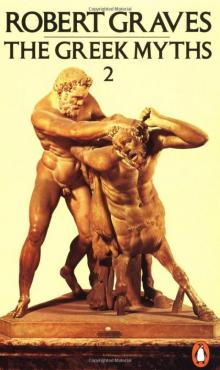 The Greek Myths, Volume2
The Greek Myths, Volume2 The Anger of Achilles: Homer's Iliad
The Anger of Achilles: Homer's Iliad Count Belisarius
Count Belisarius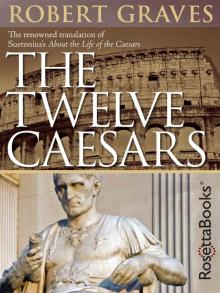 The Twelve Caesars
The Twelve Caesars Complete Poems 3 (Robert Graves Programme)
Complete Poems 3 (Robert Graves Programme) Homer's Daughter
Homer's Daughter The White Goddess
The White Goddess Goodbye to All That
Goodbye to All That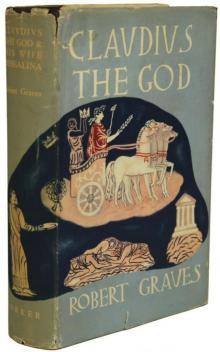 Claudius the God and His Wife Messalina
Claudius the God and His Wife Messalina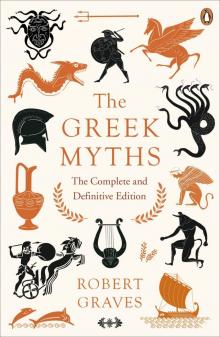 The Greek Myths
The Greek Myths I, Claudius
I, Claudius The Islands of Unwisdom
The Islands of Unwisdom Complete Short Stories
Complete Short Stories The Golden Fleece
The Golden Fleece They Hanged My Saintly Billy
They Hanged My Saintly Billy King Jesus
King Jesus Sergeant Lamb's America
Sergeant Lamb's America Hebrew Myths: The Book of Genesis
Hebrew Myths: The Book of Genesis Seven Days in New Crete
Seven Days in New Crete Proceed, Sergeant Lamb
Proceed, Sergeant Lamb Claudius the God
Claudius the God Wife to Mr. Milton
Wife to Mr. Milton The Complete Poems
The Complete Poems The Anger of Achilles
The Anger of Achilles Claudius the God c-2
Claudius the God c-2 Hebrew Myths
Hebrew Myths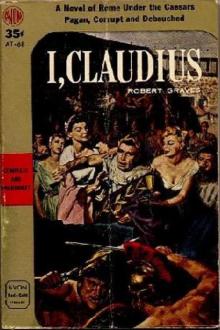 I, Claudius c-1
I, Claudius c-1 The Greek Myths, Volume 1
The Greek Myths, Volume 1